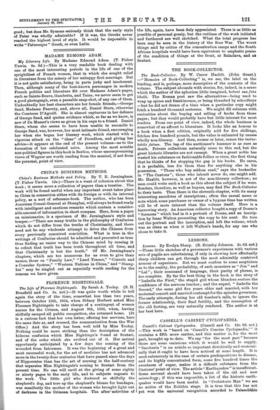The Book - Collector. By W. Carew Hazlitt. (John Grant.) —" Memoirs
of Book-Collecting" is, we see, the label on the binding, and is, perhaps, more descriptive of the contents of the volume. The subjeet abounds with stories, for, indeed, in a sense which the author of the aphorism little imagined, habent sun fate libelli. The Roman poet saw the alternatives—being used to wrap up spices and frankincense, or being thumbed by schoolboys —but he did not dream of a time when a particular copy might fetch a hundred thousand sesterces. We might fill columns with- curiosities about the buying and selling of books from these pages ; but they would probably have but little interest for most readers. From one point of view, indeed, the whole business is somewhat of an affront to literature. It looks like an honour to a book when a first edition, originally sold for five shillings, fetches five hundred pounds, but the value is enhanced by causes wholly non-literary. And then, sooner or later, comes the induc- tabile fatum. The tap of the auctioneer's hammer is as sure as death. Private collections naturally come to this end, but the great historic libraries are not exempt. When a great noble has wasted his substance on fashionable follies or vices, the first thing that he thinks of for stopping the gap is his books. He cares, it is probable, less for them than for anything else in his possession. " Those who buy seldom read," says the bookseller in "The Caxton"; those who inherit never do, one might add. Mr. Hazlitt, however, is not of the non-literary collectors ; no man could write such a book as this about the subject if he were. Readers, therefore, as well as buyers, may find The Book-Collector to their taste. Then there is the eleventh chapter, with its many interesting anecdotes of inscriptions ; often the casual name or note which some purchaser or owner of a bygone time has written will be of more interest than the volume itself. Here is a harrowing story. An American collector bought a copy of Donne's " Sermons " which had in it a portrait of Donne, and an inscrip- tion by Isaac Walton presenting the copy to his aunt. He tore out the portrait and the inscription, and left the volume, which was as clean as when it left Walton's hands, for any one who chose to take it.






















































 Previous page
Previous page